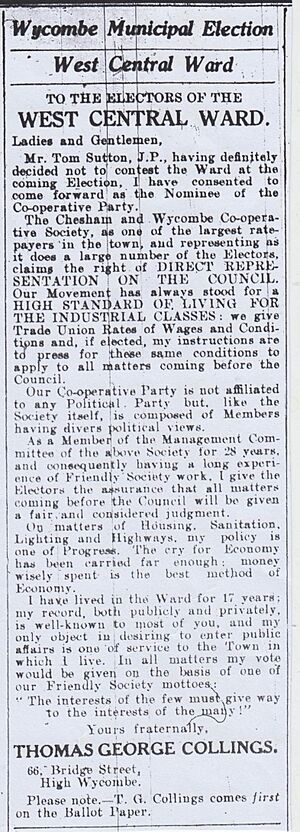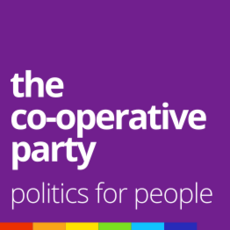Co-operative Party facts for kids
Quick facts for kids
Co-operative Party
|
|
|---|---|
 |
|
| General Secretary | Joe Fortune |
| Chair of the NEC | Jim McMahon |
| Founded | 17 October 1917 |
| Headquarters | 83 Crampton Street London SE17 3BQ |
| Youth wing | Co-operative Party Youth |
| Membership (2023) | |
| Ideology |
|
| Political position | Centre-left |
| Affiliate party | Labour Party (Labour and Co-operative Party) |
| Colours | Purple |
| House of Commons |
41 / 650
|
| House of Lords |
15 / 777
|
| Scottish Parliament |
11 / 129
|
| Senedd |
16 / 60
|
| Local Government |
938 / 19,698
|
| London Assembly |
8 / 25
|
| PCCs and PFCCs |
14 / 37
|
| Directly elected mayors |
10 / 25
|
The Co-operative Party is a centre-left political party in the United Kingdom. It supports the values of co-operatives, which are businesses or organisations run by and for their members. The party was created in 1917 by co-operative groups who wanted to elect people to Parliament to make sure co-operatives were treated fairly.
Since 1927, the Co-operative Party has worked with the Labour Party. They have an agreement not to run against each other in elections. Instead, they choose joint candidates who run under the name "Labour and Co-operative Party". Even though they work together, the Co-operative Party is its own separate party.
The Co-operative Party is the fourth-largest party in the House of Commons, with 43 Members of Parliament (MPs). These MPs are part of the main Labour group in Parliament. The party also has members in the House of Lords, the Scottish Parliament, the Senedd in Wales, and in local governments.
Unlike many other parties, the Co-operative Party doesn't have one single leader. Instead, its leadership is shared. Joe Fortune is the General Secretary, Preet Kaur Gill leads the party's MPs in Parliament, and Jim McMahon is the chair of its main committee.
History of the Party
The Co-operative Party was officially formed in 1917. This decision was made at a large meeting of the British co-operative movement in Swansea, Wales. The goal was to get people who supported co-operatives elected to the government.
Early Years and World War I
Before the party was formed, a group called the Joint Parliamentary Committee was created in 1881. Its job was to watch what Parliament was doing and try to influence MPs to support co-operatives. This was difficult because they had to convince MPs one by one.
During World War I, co-operative shops became very popular because they were against making big profits from the war. But they faced problems. The government put limits on food and fuel, and co-operatives didn't get their fair share. Their workers were often sent to fight in the war, while other businesses could keep their staff. This unfair treatment made co-operative members realise they needed their own voice in government.
So, in 1917, they voted to create a political party. The party's first goal was to elect "co-operators" to the House of Commons. The first successful candidate was Alfred Waterson, who was elected in 1918.
Working with the Labour Party
At first, the Co-operative Party and the Labour Party sometimes competed against each other. But in 1927, they made an agreement called the Cheltenham Agreement. This meant they would work together and not stand against each other in elections.
From then on, their candidates were known as Labour and Co-operative. This partnership was very successful. In the 1929 election, nine Labour Co-operative MPs were elected. One of them, A. V. Alexander, became a minister in the government.
The party's focus also grew. At first, it was mainly concerned with business issues for co-operatives. But since the 1930s, it has worked to spread co-operative ideas more widely. It now campaigns for a fair and sustainable society and supports co-operatives around the world.
After World War II
The party's partnership with Labour grew stronger after World War II. In 1945, 23 Labour Co-operative MPs were elected, and two of them, A. V. Alexander and Alfred Barnes, served in important government roles.
Over the years, the number of Co-operative MPs has gone up and down with the Labour Party's success. For example, in 1997, all 23 of its candidates won their elections. After the 2024 election, the party had 43 MPs, showing its continued importance in British politics.
How the Party is Organised
The Co-operative Party is a membership organisation. This means it is made up of individual members, local party groups, and affiliated organisations like co-operative businesses and trade unions. It is also registered as a co-operative society itself.
The party's main decisions are made by the National Executive Committee (NEC). Members of the NEC are elected by party members and affiliated groups. Every year, the party holds a conference where members can discuss ideas and vote on policies.
Who Supports the Party?
Some of the UK's biggest co-operative businesses support the party. These include The Co-operative Group, Midcounties Co-operative, and Central England Co-operative. The members of these co-ops vote each year to decide if they want to keep supporting the party.
Trade unions also support the party. Community was the first union to join, followed by the Union of Shop, Distributive and Allied Workers (Usdaw).
Local Parties
The party has local groups called Society Co-operative Parties. These groups work in different regions across the country. They are where most members get involved, helping to choose candidates and working with local Labour Parties. In Scotland, Wales, and Northern Ireland, there is one national party for each country.
Elected Representatives
The Co-operative Party has representatives at all levels of government in the UK.
Members of Parliament (MPs)
After the 2024 general election, there are 43 Labour and Co-operative MPs in the House of Commons. They represent areas all across the country. Some of the current MPs include Stella Creasy, Anneliese Dodds, and Jonathan Reynolds.
House of Lords
There are fifteen Labour and Co-operative members in the House of Lords. They are known as peers and help to check and pass laws.
Senedd (Welsh Parliament)
In Wales, there are sixteen Labour and Co-operative Members of the Senedd (MSs). They work on issues that affect people living in Wales.
Scottish Parliament
There are eleven Labour and Co-operative Members of the Scottish Parliament (MSPs). They represent different areas of Scotland.
Other Representatives
The party also has members in the London Assembly, which governs London. There are also many Labour and Co-operative Police and Crime Commissioners and mayors in cities and regions across England. In local government, there are over 900 Labour and Co-operative councillors.
See also
 In Spanish: Partido Cooperativo para niños
In Spanish: Partido Cooperativo para niños
- List of Labour Co-operative Members of Parliament
- Rochdale Principles
- British co-operative movement
 | Selma Burke |
 | Pauline Powell Burns |
 | Frederick J. Brown |
 | Robert Blackburn |



